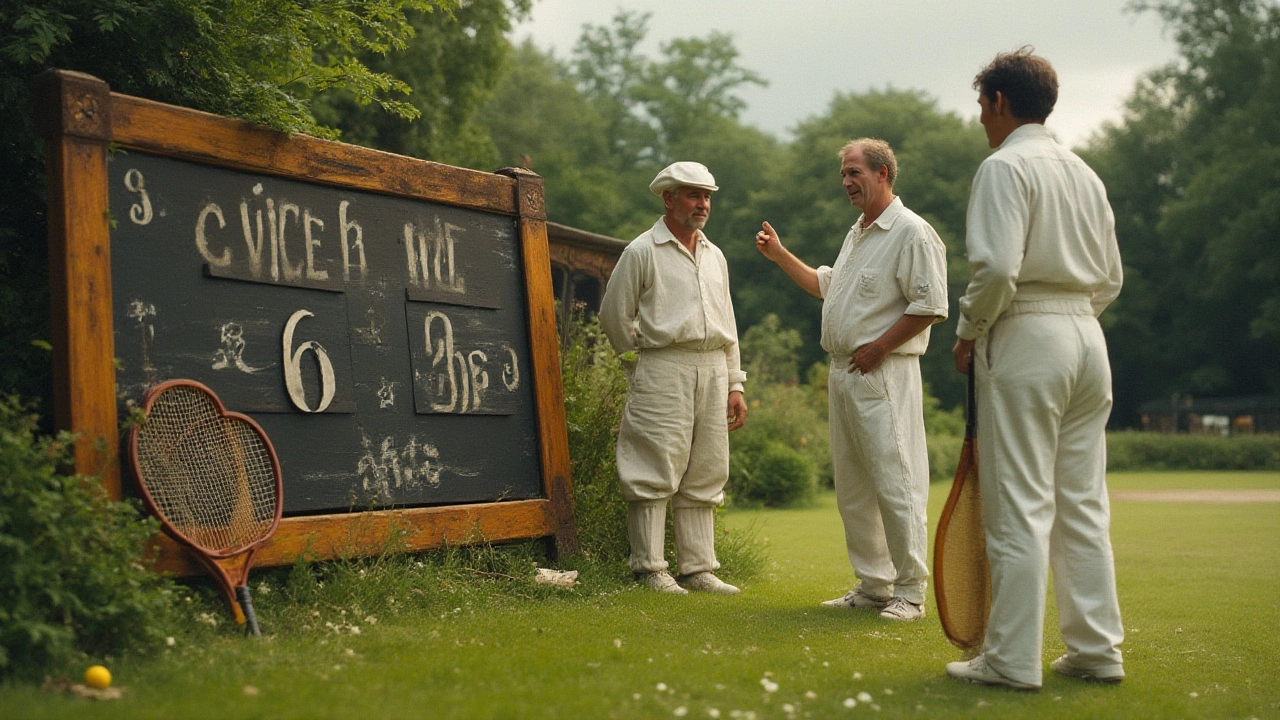6 Love in Tennis: Score Meaning, Origin, and Player Tips
 Jul, 20 2025
Jul, 20 2025
Picture this: You’re at a local tennis match, the scorekeeper yells, “Six love!” and everyone nods knowingly. But pause for a second—what does that even mean? Is it a secret code, an inside joke, some odd ritual that only tennis fans get? '6 love' has a peculiarity that raises eyebrows for tennis newcomers and casual spectators alike. If you’ve ever wondered what kind of love has anything to do with battling it out on the court, you’re about to find out. Beyond just a quirky phrase, '6 love' packs a punch in tennis matches and carries a history that’s as curious as it is iconic.
The Meaning of 6 Love in Tennis Scoring
In the wild world of tennis scoring, '6 love' is about as clear as mud until you break it down. Here’s the simple version: Tennis matches are played in sets, and to win a set, a player needs to win at least six games. When one player wins six games before their opponent takes a single game—so it’s 6-0—the score is called '6 love.' That tiny word 'love' has nothing to do with romance here. It just means zero. So, if someone says Serena Williams won the first set 6 love, they mean she totally shut out her rival, not even giving up a single game. The lopsided number isn’t just for showing off; it’s a statement. Shutting out your opponent at any level takes skill and, frankly, a bit of mental dominance.
If you look at pro matches, someone winning a set '6 love' is usually a sign they’re playing in a different league that day. But this term pops up at every skill level, from neighborhood matches to Wimbledon’s grass. Where things get even more fun is when it happens more than once—yep, double 'bagels.' Players sometimes talk about a 'double bagel' for a match score of 6–0, 6–0, but even a single set at '6 love' feels like serving up a little slice of humble pie to your opponent.
The phrase crops up in doubles, too. It doesn’t matter if you’re solo or tag-teaming—'6 love' means someone on that side did not allow a single game slip through. It’s rare but not impossible, even at the pro level. For example, at the 2012 Olympics, Serena Williams dished out a '6 love' set to Maria Sharapova. Sharapova—a superstar in her own right. That’s how much this number means when you’re dealing with elite competition.
And here’s a tip for newbies: don’t let the scoring language throw you off. Tennis is infamous for its scoring oddities—15, 30, 40, deuce. 'Love' just makes the list a little weirder, but its meaning is always zero. So, a set win of 6 love is just 6 games to zero—no drama, just numbers, and maybe a hint of pride if you’re on the right side of it.
If you’re keeping score or just trying to interpret that scoreboard across the fence from you, remember: first number is the winner’s, second the loser’s. So, 6–0 (pronounced as 'six love') means one player owned the set—and 'love' just added a bit of tennis tradition to the moment.
Where Did the Term 'Love' Come From?
Okay, so why 'love'? Why not just say 'zero' like in every other sport on planet Earth? The answer takes us on a winding trip through tennis’ history books. The most accepted theory? The word ‘love’ comes from the French word ‘l’oeuf,’ which means 'egg.' Why an egg? Because the round shape of an egg looks like a zero on the scoreboard. Picture it: centuries ago, before digital scoreboards and LED screens, you’d keep score with pebbles or chalk on a board. That oval zero? Egg-like. So the word ‘l’oeuf’ was tossed around, and as English speakers picked up tennis, ‘l’oeuf’ morphed into the more familiar-sounding English 'love.'
There's always a competing theory, though. Some old-timers argue that ‘love’ references playing “for the love of the game”—putting points aside and focusing on tennis for tennis’s sake. Nice idea, but historians usually agree the ‘egg’ explanation fits with how language changes when cultures share sports. The more you hear it during games, the easier it is to forget its bizarre origin. Now it’s just part of tennis DNA, sitting neatly next to 'deuce,' 'break point,' and other strange yet loveable terms.
Another fun fact: tennis isn’t alone in handing out eggs. In cricket, a 'duck' is what they call it when a batsman scores zero runs in an inning, again referencing the zero shape. Tennis just went gourmet and picked an egg from the French kitchen. The next time you’re watching a tournament, drop this tidbit for instant tennis-nerd cred.
Even the official rules, set by the International Tennis Federation, keep 'love' for clarity’s sake. Most scoreboards around the world light up with '0,' but you’ll always hear the umpire call out 'love' to keep that bit of sport tradition alive. It’s one of those quirks that makes tennis a little more charming—and a lot more confusing if you’re new. But once it clicks, you might even find yourself calling out 'love' at your next pickleball game out of habit.

Notable 6 Love Moments in Pro Tennis
If you think '6 love' is just for beginners, think again. Some of the greatest tennis legends have both given—and received—a 'love set.' The pressure of a packed stadium, thousand-watt TV lights, world-class rival on the other side, and a perfect shutout? It makes for some of the sport’s wildest stories.
Let’s talk history. Back in 1988, Steffi Graf did something almost mythical: she won the French Open final against Natasha Zvereva 6–0, 6–0. That’s a 'double bagel.' Inspiring for some, brutal for others, but it’s etched in the record books as the shortest Grand Slam women’s final ever. Moving to the men’s tour, Rafael Nadal is known for handing out the occasional 'bagel.' In the 2020 French Open final, Nadal bageled Novak Djokovic in the second set on his way to a straight-sets win. For context, Djokovic is one of the best defenders in the sport—so getting shut out for a whole set is rare air, even for the elite.
But nobody’s immune. Roger Federer, arguably the greatest of all time, has been bagel-ed in big matches. At the 2008 French Open final, Rafael Nadal handed Federer a 6–1, 6–3, 6–0 defeat. That last set, 6 love, stunned fans and showed that even G.O.A.T.s can have bad days at the office.
What makes these moments stand out is their psychological warfare. When you lose a set zero games won, it takes grit and strong nerves to bounce back rather than crumble. Not all 6 love sets end in straight-set victories, either. Some pros get bageled and then roar back, flipping the match. That rebound tells you just how much mental toughness tennis demands. Anger can fuel a comeback, or nerves can sink a whole match. If you want proof, look up the 2017 Australian Open final, where Roger Federer dropped a set 6–3 to Rafael Nadal but still clawed back to take the title.
'6 love' stands for dominance, yes, but also the wild swings of human competition. The pros study their games, pick apart footage, and use every tactic possible to avoid that zero, but sometimes momentum just crashes down. The next time you spot a 6 love set at any level, realize you’re watching a powerful moment in the sport—one that players remember long after the match ends.
How to Avoid Getting 'Bagelled': Tips for Players
No one steps on the court hoping to see a '6 love' on the wrong side of their name. Losing a set without snagging a single game stings, whether you’re playing at a local club or under the bright lights of Wimbledon. But the good news? There are ways to dodge the dreaded bagel, and they often come down to mental approach and smart tactics, not just raw talent.
First, don’t panic if you fall a couple games behind. Tennis is a game of runs—and the score resets every game. Take a deep breath before each point, and focus on winning just the next one. Many players, especially beginners, lose momentum and confidence after a string of fast points against them. That leads to easy mistakes, especially on serve. Instead, try a different tactic: slow the pace, lengthen rallies, and force your opponent to work for every point. If you’re consistently getting beat by aggressive hitters, use high looping balls or aim deeper, right at the baseline. Make the other player hit one more shot, every time.
Hone your serve, even if it means simply getting the ball in with consistency rather than going for aces. A reliable serve puts pressure back on your opponent and helps you claim those essential free points to avoid a shutout. If nerves are your enemy, develop a pre-serve routine—maybe a bounce or deep breath—to lock in focus and keep things consistent.
Tennis is a mental game. Even pros get bagelled, as the stats prove. The difference between them and everyone else? They recover fast. Wipe each game from your memory. Don’t dwell on lost points—reset and get back to basics: first serves in, foot movement, smooth swings. Sometimes shifting your attitude can steal just enough momentum to avoid a shutout. Celebrate every point you win as a mini-victory, and you might snag a game or two to break the spell.
If you really want to nerd out, break down your matches after you play. Were you short on gas, missing forehands, or getting picked apart at the net? Understanding your own patterns is key to avoiding future bagels. And if you’re up against a player handing out '6 love' sets left and right—well, learn from what they do. Watch how they build points or shift tactics. The more you play, the more you realize 'love' isn’t fate—it’s just another piece of tennis tradition, ready to be challenged one point at a time.